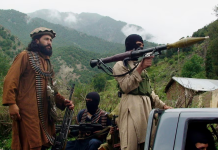DNA
Kabul, Afghanistan’s Taliban government on Tuesday marked the second anniversary of their return to power with celebrations and a public holiday, saying “no invader” would be allowed to threaten the country.
Flags of the Islamic Emirate of Afghanistan — the Taliban’s formal name for the country — fluttered at security checkpoints across the capital Kabul, which fell on August 15, 2021 after the US-backed government collapsed and its leaders fled into exile.
In the two years since, Taliban authorities have imposed their strict interpretation of Islam, with women bearing the brunt of laws the United Nations has termed “gender apartheid”.
A statement from the authorities hailed a victory that was able to “pave the way for the establishment of the Islamic system in Afghanistan”.
“The conquest of Kabul proved once again that no one can control the proud nation of Afghanistan” and that “no invader will be allowed to threaten the independence and freedom” of the country, it said.
Hundreds of Taliban supporters, from elderly men to young boys, gathered near the abandoned US embassy building, one of the many that now stands empty — the Taliban government is still not formally recognised by any other country.
US-made military vehicles, claimed by the new Taliban rulers when they were left behind by international forces after a weeks-long chaotic withdrawal, rolled past the ajar gates of the fortified embassy walls.
– ‘Need to celebrate’ –
Some of the men in the crowd carried their weapons, while others snapped smiling selfies as anthems blared and vendors sold the Taliban movement’s white flag inscribed with the Islamic declaration of faith.
In the city of Herat in the west, a crowd of Taliban supporters chanted: “Death to the Europeans, death to the Westerners, long live the Islamic Emirate of Afghanistan, death to the Americans.”
In Kandahar, the cradle of the Taliban movement and from where reclusive Supreme Leader Hibatullah Akhundzada rules by decree, a military parade was cancelled then moved to a military compound, officials told journalists.
Kandahar resident Agha Sahib praised Akhundzada’s leadership, saying he had unified the country.
“When he issues a decree from (Kandahar), it is accepted in Panjshir, Kabul, Nimroz, Herat, Zabul, and all over 34 provinces of Afghanistan,” said the 24-year-old who works for the interior ministry.
The decrees have not been welcomed equally by all Afghans, however, nor by the international community, which is divided over whether to engage with the Taliban authorities.
Restrictions on the rights of women — squeezed from public spaces, employment and education — have been key obstacles to recognition and aid, which was slashed as foreign nations were wary of dealing with Kabul’s new rulers.
Non-governmental groups have marked the anniversary by again condemning the Taliban authorities’ treatment of women.
“Despite reassurances by the Taliban de facto authorities that any restrictions, particularly in terms of access to education would be temporary, the facts on the ground have demonstrated an accelerated, systematic, and all engulfing system of segregation, marginalization and persecution,” UN experts said in a statement on Monday, hitting out at Taliban pledges of a softer rule than during their stint in power from 1996 until 2001.
Human Rights Watch urged donor countries “to find ways to mitigate the ongoing humanitarian crisis without reinforcing the Taliban’s repressive policies against women”.

















